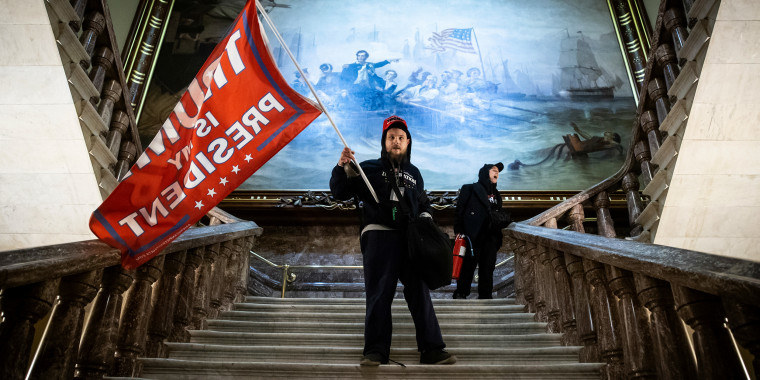In the biggest study of its kind, the fine minds at the Shorenstein Center on Media, Politics and Public Policy at Harvard University pored over close to 500 documents filed to the U.S. District Court for the District of Columbia in search of what motivated 417 Capitol rioters who have been charged in relation to the Jan. 6 insurrection. After careful examination of vast amounts of evidence, including social media posts and private messages, they’ve come to a shocking conclusion: Donald Trump’s lies are the most important motivator for why the rioters showed up that day.
All jokes aside: the study might confirm what we already know, but it actually is important. In a politically polarized world in which it’s easy for partisans to dismiss every major event as reducible to tribal narrative, rigorous empirical studies carried out by scholarly institutions are essential for the public record — and for forcefully refuting conspiracy theories.
The report's findings were shared with NBC News ahead of its release. According to NBC News’ breakdown of the report, “A plurality of rioters cited either their support for Trump (20.6%) or Trump’s false belief that the election had been stolen (also 20.6%) as their primary motivation for their actions that led to charges on Jan. 6.” The third most frequently cited reason from defendants was a belief that they were taking part in “revolution, civil war, or secession.”
Other less commonly listed reasons included to “peacefully protest” (7%) and “general interest in violence” (6.2%).
The topline takeaway from this data is that a plurality of defendants who breached the Capitol said they were there because of Trump’s disinformation agenda which falsely claimed that the election had been stolen. The findings are obvious to any political observer who doesn’t live under a rock and doesn’t traffic in conspiracy theories, but it helps cement Trump’s culpability. It’s a bit like the House Jan. 6 committee’s public hearings — no liberal political junkie watching them is going to encounter much that is startlingly new, but every carefully examined piece of information helps set the record straight on what happened and exactly how it happened.
In our polarized political environment, there are huge limitations on the persuasive potential of these projects in the short-term, but that doesn’t mean the effort to uncover the truth is any less worthwhile or important for historical purposes.
It also helps further weaken evidence-free or fabricated claims on the right — from figures like Fox News’ Tucker Carlson — that Jan. 6 rioters were actually antifa counter-protestors or primarily violent oddballs who were uninfluenced by Trump and simply looking to start any kind of fight. The more we can turn to information collected from careful study, the more difficult it becomes for disinformation agents to exploit the innately ambiguous nature of political protests for cynical ends.
The authors of the study told NBC News they also hope that social media companies can make use of greater knowledge of what happened in the run-up to Jan. 6. “What we’re trying to understand is really the new potent forms of political violence that can come from agitation online, that creates this kind of fervor. And then, once the match is lit by a politician, we have to have appropriate responses by other actors, including not just law enforcement, but journalists and technologists,” Joan Donovan, director of Harvard University’s Shorenstein Center and one of the authors of the report, told NBC News.
The more carefully we’ve documented what went wrong, the more likely it is we can get it right when it comes to anticipating — and guarding against — such events again in the future.

